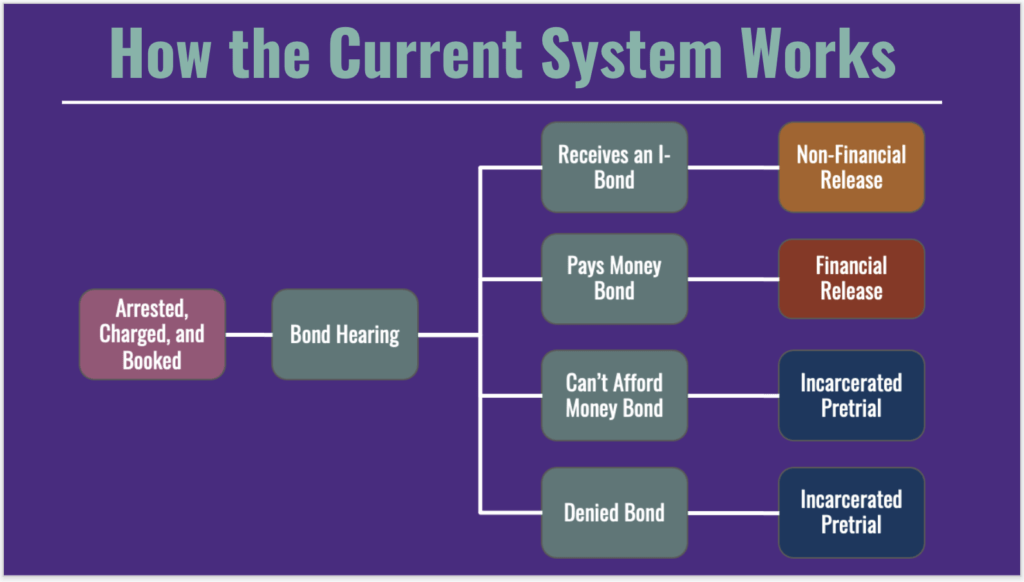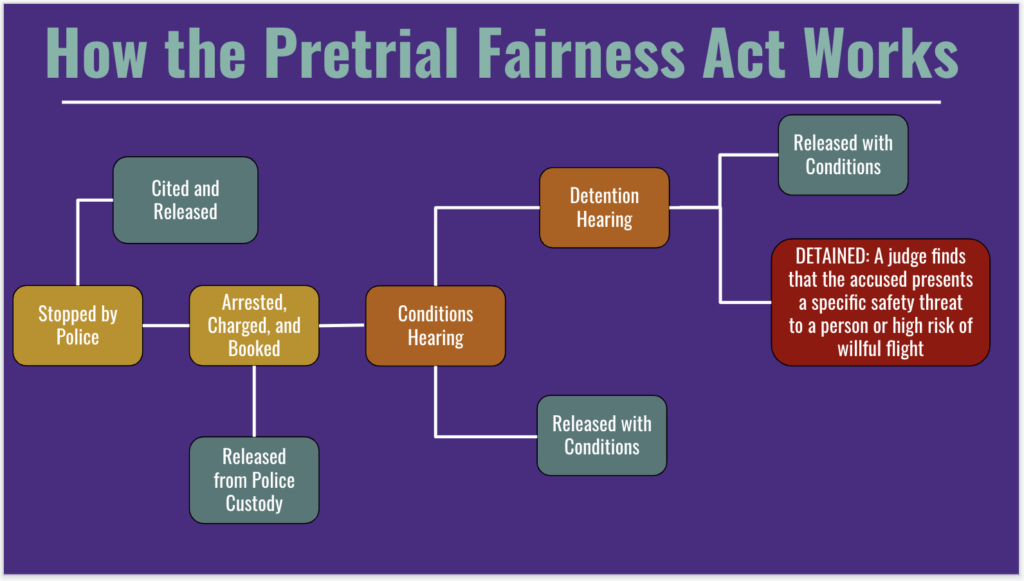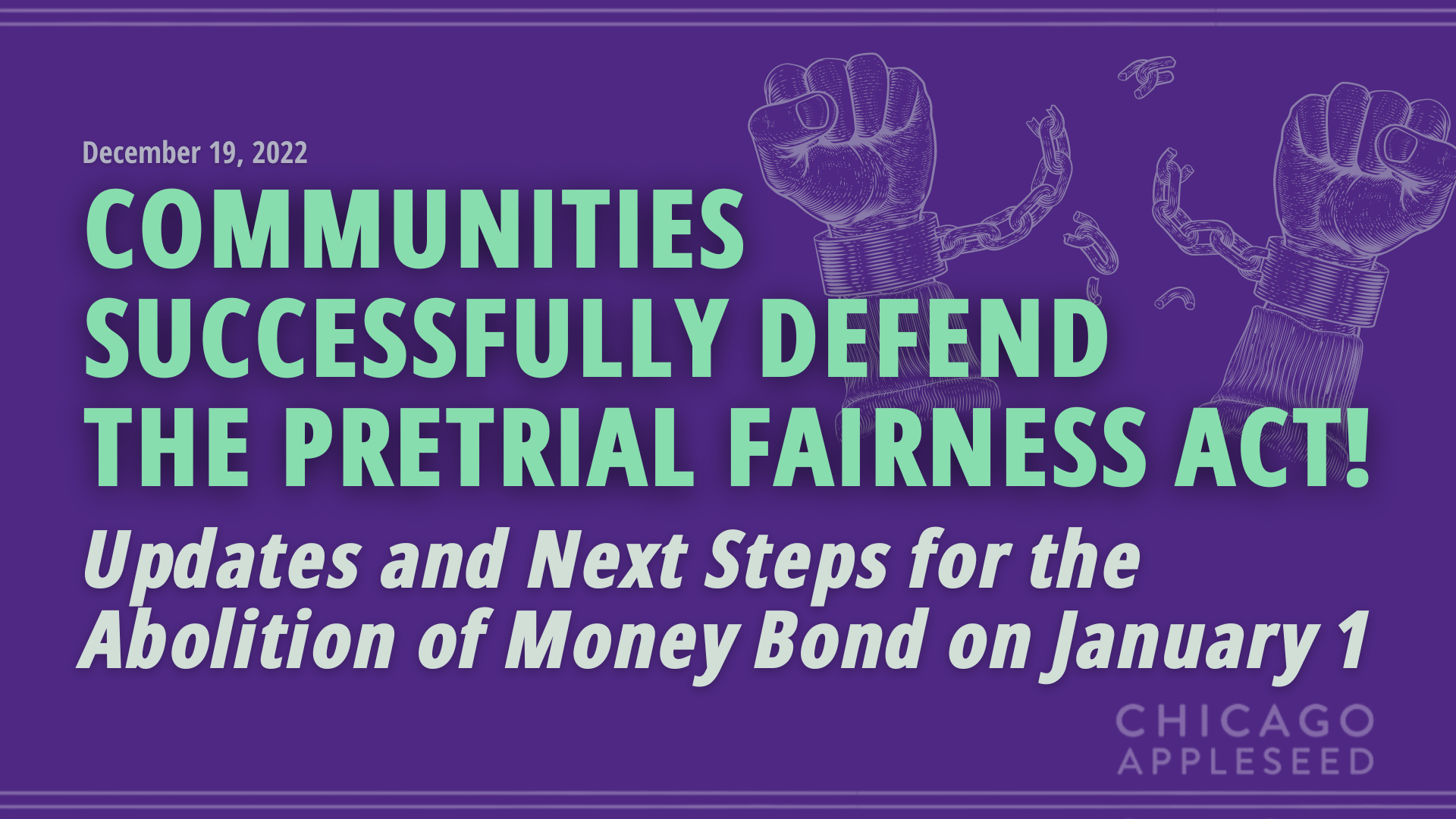Communities Successfully Defend the Pretrial Fairness Act: Updates and Next Steps for the Abolition of Money Bond on January 1
On December 6, Governor Pritzker signed Public Act 102-1104, a trailer bill that clarifies aspects of the Pretrial Fairness Act to allow for the successful implementation of the state’s no-cash-bail system starting on January 1, 2023. Since the Safety, Accountability, Fairness, and Equity – Today (SAFE-T) Act was passed and was originally signed into law by Governor Pritzker in February 2021, the Pretrial Fairness Act provision (which replaces the money bail system with an equitable system focused on safety) of the legislation has faced considerable opposition and misinformation campaigns that have threatened its integrity.
With the Pretrial Fairness Act and the subsequent passage of the trailer bill, Public Act 102-1104, the new pretrial system will not only end wealth-based pretrial incarceration but will significantly improve public safety by creating a fairer, more common-sense-based process focused on community safety. Public Act 102-1104 offers several important clarifications to the Pretrial Fairness Act, including around detention eligibility, timelines by which people in jail will have their cases reviewed, and a strict 48-hour period between arrest and first appearance in court.
With the passage of House Bill 1095 (Senate Amendment 2), our communities have successfully defended the Pretrial Fairness Act and can begin moving toward implementation.
How the Current Cash Bail System Works in Illinois
The current cash bail system in Illinois varies slightly between counties, but generally, all people charged with felonies and certain misdemeanors appear before a judge in bond court without 72 hours of arrest. A felony charge requires an accused person to be held overnight; for misdemeanor charges, some people are released from police stations (with or without paying a money bond), but certain charges (such as most domestic violence charges) or the inability to pay an ordered money bond requires an appearance in bond court. Once someone reaches bond court, they appear before a judge who makes one of a few possible decisions: (1) they release the person without requiring any money up front (an “I-Bond” or release on recognizance); (2) they release the person on the condition that they pay a bond (either 10% of the bond amount, a “D-Bond” or Deposit Bond, or the full amount, a “C-Bond” or Cash Bond); or (3) they deny bond and incarcerate the person on a “no bond hold” until their trial. Judges can also order conditions of pretrial release along with bond, such as mandated supervision by a pretrial services agency, electronic monitoring (house arrest), or protective orders that prohibit accused people from going to a certain place or being near a certain person.

The current system punishes poor people even before they’ve been convicted of a crime by requiring families to come up with extremely high amounts of cash. If accused people or their families can’t afford to pay bail, they sit in jail until their trial—which causes them to lose their jobs, housing, and kids, and puts families in communities in extremely difficult situations. You can learn more about the current money bail system in this report by the Illinois Network for Pretrial Justice.
How the New Pretrial Fairness Act System Works
Starting on January 1, 2023, the Pretrial Fairness Act will not only significantly reduce the number of people in jail pretrial, but will also reduce the number of people who are arrested in the first place. One of the key provisions of the legislation requires police to ticket people for low-level allegations instead of automatically arresting them. While police can still arrest people for low-level charges if they (a) pose a risk to the community, (b) have obvious medical or mental health issues that risk their own safety, or (c) have already been ticketed for the same behavior in the past, this provision will save taxpayers money, save law enforcement and court staffers’ time, and will also limit the trauma caused to individuals and communities by arrest and incarceration.
If a person is arrested, their first appearance in court must be within 48 hours of arrest. At this hearing, the prosecutor must decide if they want the accused person to be jailed; if they ask for pretrial incarceration, the judge will hold a hearing where the prosecution and the defense have the opportunity to present evidence and witnesses. People arrested in Illinois will only be eligible for jailing pretrial if they (a) are charged with certain serious crimes (most forcible, gun, and sex crimes, DUIs where someone is injured or killed, or when it is someone’s fourth or more DUI, domestic violence, violation of order of protection, and stalking cases, and drug delivery and possession with intent to deliver where there is a mandatory minimum prison sentence, among others), (b) are at risk for willful flight, and/or (c) are already on pretrial release, probation, or parole for another charge. Not everyone who meets these criteria will be jailed but judges must use these standards to determine whether someone can be held in custody.

The new system will allow people who can’t meet conditions of release – for example, if they can’t afford to pay for treatment or electronic monitoring – to request a review hearing that must happen with 48-hours and allows people to appeal conditions of release (like house or no contact orders with one’s children). For people who were jailed prior to January 1, 2023, the accused person can request a rehearing that must be held within 7, 60, or 90 days of the date of their request (the timeline depends on the charge).
The Pretrial Fairness Act will ensure that no person is jailed pretrial solely because they can’t afford to buy their freedom.
This a major win for civil rights and Chicago Appleseed Center for Fair Courts is incredibly proud of the role we’ve played in the process throughout the years. In 2016, we helped found the Coalition to End Money Bond, the group that has led the charge to make the pretrial court system less reliant on money as the arbiter of pretrial freedom; in 2017, our advocacy helped push Cook County Chief Judge Timothy Evans to implement General Order 18.8A, which initiated bond reform in Cook County and freed thousands of people from pretrial incarceration, avoided the wealth-based discrimination of money bail, and helped reduce the racial disparities in pretrial incarceration—all without impacting public safety in Chicago; and in 2020, as a member of the Coalition to End Money Bond’s policy team, we worked with legislators to draft, advocate, and lobby for the passage of the Pretrial Fairness Act, which will end money bond and create a more equitable pretrial system starting in 2023.
Going forward, we will contribute to work with the Coalition to End Money Bond and the Illinois Network for Pretrial Justice to ensure the Pretrial Fairness Act is implemented effectively. For more information, follow along on our blog.

